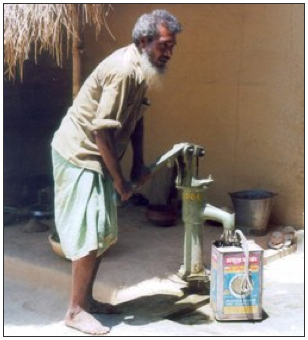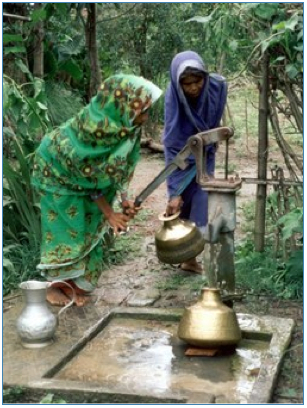Jibon pump


The Jibon Pump is a lever operated deep-set pump for shallow wells. Typically, Jibon Pumps are installed in collapsible tube wells with the screen extending to the coarse sand aquifer. It is designed for family use, serving up to 100 persons. The Jibon Pump is reasonably corrosion resistant and the maximum recommended lift is 18 m, although 15m is more standard. The Jibon Pump is a public domain pump defined by RWSN specifications. It is easy to install and has excellent potential for community-based maintenance.
Suitable conditions
The Jibon Pump is not designed for a high daily output; it is rather a family or small community pump.
| Depths to be used: | between 0-18 m |
| Cylinder diameter: | 54.0 mm |
| Maximum Stroke: | 215 mm |
| Approx. discharge (75 watt input): | at 5 m head: 3.0 m³/hour
at 10 m head: 1.8 m³/hour |
| Population served: | 50 - 100 people |
| Households: | 5 - 10 hh |
| Water cons.: | 20 - 25 l/per capita |
| Type of well: | borehole or dug well |
Construction, operations and maintenance
Pump head and handle are made of cast iron, pump rods are of FRP-material (Fibre glass Reinforced Plastic). The rising main, the suction pipe and the Robo screen are of PVC-U pipe, Plunger and foot valve are of PVC-U, stainless steel and rubber. This makes this pump reasonably corrosion resistant.
The Jibon Pump has an excellent potential for local manufacturing.
The installation of the Jibon Pump is easy and does not need any lifting equipment or special tools. The drillers who sink the tube wells with the “sludging method” are also installing the pumps.
Maintenance
This pump has an excellent “Community Management Potential”. Only two spanners are needed to repair the plunger and the foot valve. All maintenance operations can be performed by a village caretaker.
Costs
Manuals, videos, and links
- MUDGAL, A. K. and ERPF, K. (2005) Jibon Deepset Pump Specification (2"). (Revision 1-2005), Skat, Rural Water Supply Network, St Gallen, Switzerland.
